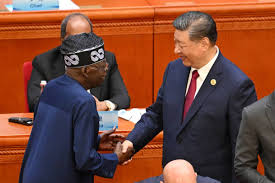President Bola Ahmed Tinubu has said that Nigeria is now in a strategic position to become a net exporter to China within the next five years, following China’s recent decision to remove import tariffs on goods from 53 African countries, including Nigeria. This move by Beijing, he noted, creates a historic opportunity for Nigeria to grow its exports, particularly in agriculture, manufacturing, and digital trade.
Tinubu made the statement during the Nigeria-China Sustainable Business, Bilateral Trade and Investment Summit, which held in Lagos on Monday, June 24. He was represented at the event by Joseph Tegbe, the Director-General and Global Liaison of the Nigeria-China Strategic Partnership.
According to him, the new trade gesture from China is a game-changer. “The partnership for trade prosperity reflects China’s commitment to zero-tariff access for least-developed countries, including Nigeria. This is an unprecedented gesture by a major economic power,” Tinubu said.
China, last week, officially began implementing a zero-tariff policy on imports from African countries. The policy affects a wide range of goods, including agricultural produce, beauty products, and personal care items. Tinubu said this development should spur Nigeria to take full advantage of the opportunity to increase exports and re-industrialise its economy.
The President highlighted ten key sectors where Nigeria is poised to benefit from China-Africa collaboration. These include agriculture, cassava value chain, automotive manufacturing, mineral extraction, digital trade, and green energy. He revealed several ongoing Chinese investments in Nigeria: a $1 billion integrated agricultural investment, an $800 million cassava project, a $1 billion electric vehicle battery and mineral investment, and a $1.2 billion automotive programme. Additionally, there are $10 billion worth of investment commitments in the oil and gas sector.
Tinubu said the Lekki Deep Seaport, partly financed by Chinese investors, is an example of the type of infrastructure Nigeria must use to anchor regional trade under the Belt and Road Initiative. He added that about 30 major infrastructure projects and logistics corridors have been proposed as part of Nigeria’s participation in the initiative.
To maximise these opportunities, the President called for the support of the National Assembly. He urged lawmakers to pass enabling legislation to improve trade facilitation, remove regulatory bottlenecks, reform Customs processes, and harmonise tariffs. He also called for laws to support agro-technology transfer, budgetary allocations for demonstration farms, and policies to boost rural livelihoods and food security.
“Parliament must champion climate and environmental legislation, promote renewable energy policies, and ensure Nigeria benefits from clean energy and green innovation,” he said.
The President said Nigeria must ensure it is not on the sidelines of China’s expanding investment footprint in Africa. “China must not be at the periphery of Nigeria’s investment landscape. It should be strategically and centrally positioned,” Tinubu said.
He also emphasised that the ease of doing business must be improved, stating that enabling laws are needed to unlock foreign capital, encourage technology transfer, and attract sustainable investment.
Other speakers at the event echoed the President’s message. Speaker of the House of Representatives, Tajudeen Abbas, represented by House Minority Leader Kingsley Chinda, said the House would soon introduce a bill to promote trade facilitation and align Nigeria’s economy with global standards.
“We support enacting legislations that ensure the free flow of business,” Chinda said, assuring participants that the legislature would actively work to create a more welcoming business environment.
Minister of Foreign Affairs, Yusuf Tuggar, who was represented by Bolaji Akinremi, a senior official in the ministry, said Nigeria-China relations must evolve beyond a buyer-seller dynamic. He stressed the need for fairer trade terms and a more balanced partnership.
He urged Nigeria to lead the Economic Community of West African States (ECOWAS) in forming a single, competitive trade bloc and to push for reciprocity clauses in bilateral agreements with China.
“Reciprocity clauses are needed to address the trade imbalance between Nigeria and China,” Tuggar said. He also called for tax reforms and tariff harmonisation to elevate Nigeria’s position in trade talks.
The summit highlighted several other areas of potential cooperation between both countries, including support for hospital development, public health investments, climate resilience initiatives, e-vehicle manufacturing, and innovation hubs.
President Tinubu concluded by saying that Nigeria’s partnership with China must be anchored on shared values, sustainable development, and mutual respect.
